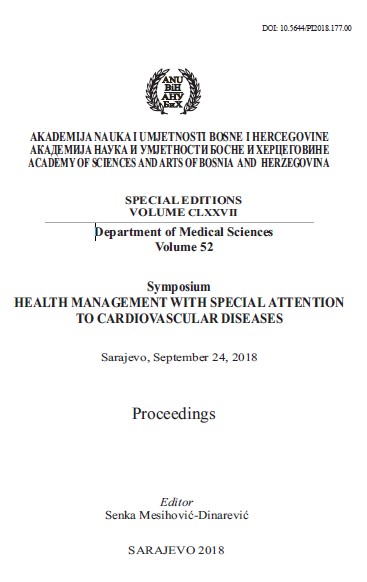RELATIONSHIP BETWEEN CARDIOVASCULAR RISK FACTORS AND SOCIO-ECONOMIC FACTORS: THE EXAMPLE OF SOUTH-EASTERN EUROPEAN COUNTRIES
RELATIONSHIP BETWEEN CARDIOVASCULAR RISK FACTORS AND SOCIO-ECONOMIC FACTORS: THE EXAMPLE OF SOUTH-EASTERN EUROPEAN COUNTRIES
Author(s): Velma Pijalović, Jasmina Selimović, Tea Mioković
Subject(s): Health and medicine and law, Demography and human biology, Economic development, Socio-Economic Research
Published by: Akademija Nauka i Umjetnosti Bosne i Hercegovine
Keywords: cardiovascular disease; epidemiological transition; economic factors;
Summary/Abstract: Cardiovascular disease is recognized as a leading cause of mortality in developed societies and one of the most fatal conditions affecting the health of developing countries’ populations. In addition to the generally expected risk factors such as family history, diabetes, obesity, smoking and hypertension, recent research shows that socio-economic status plays important part in the pathogenesis of cardiovascular disease. There are many evidence that adverse socio-economic conditions are associated with a higher risk of cardiovascular disease and premature mortality. Therefore, in the present article, we aim to review the relationship between the six dimensions of socio-economic factors at macro level (economy, education, transport, urbanization, health habits and health management) and the selected risk factors for cardiovascular diseases (obesity, diabetes and hypertension). The analysis was conducted on the example of the following countries of South Eastern Europe: Albania, Bosnia and Herzegovina, Bulgaria, Croatia, Cyprus, Greece, Macedonia, Montenegro, Romania, Serbia, Slovenia and Turkey.
Book: Simpozij - Menadžment u zdravstvu s posebnim osvrtom na kardiovaskularne bolesti
- Page Range: 95-108
- Page Count: 14
- Publication Year: 2018
- Language: English
- Content File-PDF

